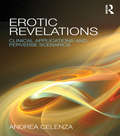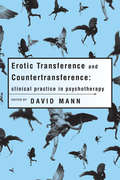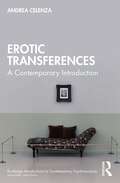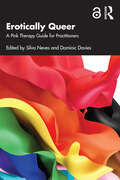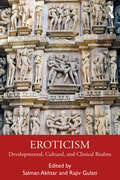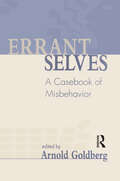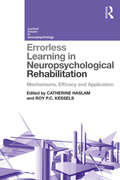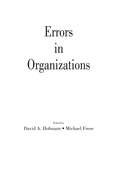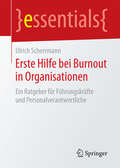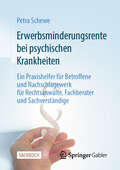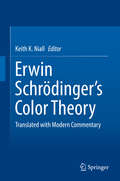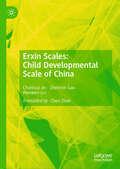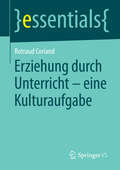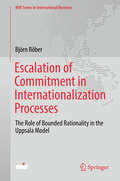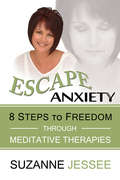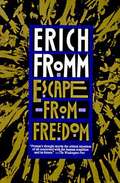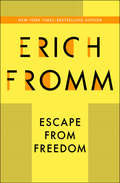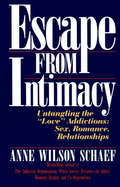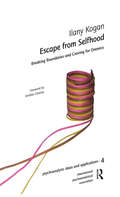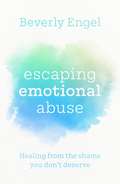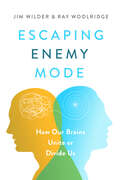- Table View
- List View
Erotic Revelations: Clinical applications and perverse scenarios
by Andrea CelenzaErotic Revelations: Clinical Applications and Perverse Scenarios delves into erotic desires and fantasies … above all, how our sexuality expresses our inner being and defines the ways in which we engage in the psychoanalytic situation. Andrea Celenza addresses the 'desexualization' of the psychoanalytic field by reclaiming sexuality as one of the many nexes that are of central concern to the patient. She illustrates a wide range of erotic manifestations (for both therapist and patient) and offers recommendations to practitioners for dealing with erotic material when it arises. Andrea Celenza has divided this book into two parts, with clinical, theoretical, and technical discussions in each chapter: Part I: Varieties and Meanings of Erotic Transferences and Countertransferences Presents the varieties and meanings of erotic transferences and countertransferences common in clinical situations; Includes case studies of erotic material used as examples of phases in treatment as well as moments of defensive impasse; Includes discussions of the management of aggression, underlying merger fantasies, uses of countertransferences (in multiple forms), and dilemmas surrounding self-disclosure. Part II: Perverse Scenarios Revisited Reconceptualizes and restores the term perversion into the clinical lexicon; Views perversion as a quality of relating rather than a specific action or behavior; Presents a wide range of clinical illustrations that demonstrates the usefulness of this reformulation. Erotic Revelations puts sexuality back into psychoanalytic theorizing and makes a place for erotic transferences of whatever shape, in every analysis or therapy. With a strong clinical focus, this book will redefine how to work with many aspects of sex and gender in clinical psychoanalytic practice and will be an essential resource for psychoanalysts, psychotherapists, psychologists, educators, trainers, students and those with an interest in the mental health field.
Erotic Transference and Countertransference: Clinical Practice In Psychotherapy
by David MannErotic Transference and Countertransference brings together, for the first time, contemporary views on how psychotherapists and analysts work with and think about the erotic in therapeutic practice. Representing a broad spectrum of psychoanalytic perspectives, including object relations, Kleinian, Jungian and Lacanian thought, the contributors highlight similarities and differences in their approaches to the erotic in transference and countertransference, ranging from love and sexual desire to perverse and psychotic manifestations. Erotic Transference and Countertransference offers ways of understanding the erotic which should prove both useful and thought-provoking.
Erotic Transference: A Contemporary Introduction (Routledge Introductions to Contemporary Psychoanalysis)
by Andrea CelenzaErotic Transferences: A Contemporary Introduction offers a comprehensive introduction to this key, yet challenging aspect of the psychoanalytic process.Despite emerging frequently in the psychoanalytic process, Andrea Celenza highlights the sparseness of literature on erotic transferences and a tendency to desexualise psychoanalytic theorizing, which she posits is a result of the inherent threat erotic transferences can pose to the analyst. By providing a thorough overview of the topic, clarifying terminology, and providing vivid case examples, Celenza seeks to redress this omission. Throughout this volume, she discusses the interplay of power and gender, along with chapters on the temptation of disclosure and the disturbing prevalence of sexual boundary violations.Providing practitioners with the tools to deal with the intense feelings that inevitably arise with erotic transferences, this book is vital reading for all psychoanalysts at all levels of experience and seniority, psychodynamic practitioners, instructors, candidates, and trainees.
Erotically Queer: A Pink Therapy Guide for Practitioners
by Dominic Davies Silva NevesErotically Queer is a practice guide for clinicians, bringing together experts in their field with pioneering topics within GSRD (gender, sex and relationship diversity). Chapters cover an array of topics rarely discussed in either clinical or popular literature including lesbian sex, queer menopause, bisexuality, working with shame, the sex lives of asexuals, sexuality and transgender people, treating anodyspareunia, compulsive sexual behaviours and chemsex. It also helps practitioners reflect on their biases regarding BDSM/kink and understand more regarding non-pathologising practices with intersex people. The book aims to help all clinicians work more effectively with the Queer population, with the most contemporary sexological knowledge.
Eroticism: Developmental, Cultural, and Clinical Realms
by Salman Akhtar Rajiv GulatiWith contributions from distinguished scholars and clinicians who view human erotic desire from modern developmental, relational, societal, and cross-cultural perspectives, Eroticism: Developmental, Cultural, and Clinical Realms offers a multifaceted and up-to-date glimpse into what we find sexually attractive and why. While psychoanalysis has unshackled itself from the narrow confines of instinct theory to include ego psychology, object relations theory, self psychology, and the contemporary relational paradigm, such heuristic and clinical advance is sorely needed to further our grasp of human eroticism and love. Accommodation also needs to be made for the cultural changes that have occurred over the last five or six decades. These include the feminist corrective to the phallocentrism of ‘classical’ psychoanalysis, the new insights into human subjectivity and personality development provided by the gay and lesbian movement, the contemporary de-centering of the essentialist and binary gender formulations, and the post-colonial voices of the non-Western people. By providing theoretically anchored clinical guidelines, Eroticism provides not only an update on the early analytic understanding of human eroticism but advances clinical praxis as well.
Errant Selves: A Casebook of Misbehavior
by Arnold GoldbergA major addition to the psychoanalytic casebook literature, Errant Selves: A Casebook of Misbehavior is a collection of case studies dedicated to the psychoanalytic understanding and treatment of behavior disorders. The contributors to this volume explore cases of perversion, delinquency, and addiction in which the misbehavior at issue served primarily to ward off painful affects or states of dysphoria in order to achieve a basic integrity of the self. For these patients, the pathway to self-cohesion entailed the florid acting out typical of narcissistic behavior disorders. Clinical readers of all persuasions will be intrigued by treatment narratives that chronicle the special challenges of working with patients who, in Goldberg's words, "were neither unitary selves nor persons with an easy ability to bolster or reconstitute themselves in socially acceptable ways." Of special interest is the contributors' sensitivity to what they missed with these troubled and troubling patients; they recount examples of skewed focus, of strained rationalization, even of glaring clinical omission, all of which suggest that the patients' psychic splits activated parallel splits on the part of their therapists. What emerges from the contributors' efforts, then, is very much a casebook of our time. It extends the purview of psychoanalysis to the developmental history and psychodynamics of disavowal; explores the analytic management of delinquent, perverse, and addicted patients; and examines the analyst's subjective presence in these treatments, including his or her potential for self-deception and collusion. And it does so in the context of probing a theoretical issue of continuing practical import: whether or not psychoanalytic therapy is best served by viewing the patient as a unitary individual with a coherent sense of agency and an integrated set of values and goals.
Error of Judgment
by Dexter DiasDexter Dias, Britain's Scott Turow, has written his second blockbuster novel: a high-octane thriller of sexual obsession, legal intrigue, and an astounding deception. Behind a four-inch plate glass window in a prison hospital, a man sits silent, his hair burned off his skull, his eyes fluttering in a dream state. His lawyer, Nick Downes, is waiting for him to speak, to explain why he showed up in a brothel carrying a claw hammer, confessing to a murder in a chalk quarry in Kent. While forensic scientists search for clues to the victim's identity, and a beautiful prison psychiatrist tries to unlock the defendant's unconscious, a woman of extraordinary sensuality appears claiming to be the defendant's wife. Nick cannot resist her. But as the case goes to trial, Nick realizes that both his client and this woman have dangerous secret identities. A web of betrayal is being spun around him, and it will leave Nick fighting for his career, his freedom, and his life.
Errorless Learning in Neuropsychological Rehabilitation: Mechanisms, Efficacy and Application (Current Issues in Neuropsychology)
by Catherine Haslam Roy P.C. KesselsErrrorless learning is one of the most studied principles in neurorehabilitation. This is the first volume to capture all the key elements in the field in one invaluable resource, providing an up-to-date and broad analysis of the use of errorless learning principles in rehabilitation after brain injury. With contributions from key researchers in the field, Errorless Learning in Neuropsychological Rehabilitation covers the historical foundations of errorless learning, current understanding of underlying mechanisms which support learning and its use in memory and language in rehabilitation as applied to particular populations across the age span. This volume also addresses questions of efficacy through analysis of research comparing errorless learning with other established learning methods and principles. Errorless Learning in Neuropsychological Rehabilitation is an essential resource for practitioners, researchers and students of psychology, neuropsychology and rehabilitation.
Errors in Organizations (SIOP Organizational Frontiers Series)
by Michael Frese David A. HofmannDespite the significance and prevalence of errors in organizations, there has been no attempt within the field of Industrial and Organizational Psychology to create a single source summarizing what we know regarding errors in organizations and providing a focused effort toward identifying future directions of research. This volume answers that need and provides contributions by researchers who have conducted a considerable amount of research on errors occurring in the work context. Students, academics and practitioners in a wide range of disciplines, i.e., industrial organizational psychology, medicine, aviation, human factors and systems engineering, will find this book of interest.
Erste Hilfe bei Burnout in Organisationen: Ein Ratgeber für Führungskräfte und Personalverantwortliche (essentials)
by Ulrich ScherrmannUlrich Scherrmann beschreibt in diesem essential das Burnout-Syndrom, um davon ausgehend die Ursachen anhand eines systemischen Burnout-Modells n#65533;her zu beleuchten. Bisher wird den betrieblichen Ursachen f#65533;r die #65533;berlastung von Mitarbeitenden, den sogenannten organisationalen Faktoren, noch zu wenig Beachtung geschenkt. Es dominieren die personalen Ursachen, z. B. dass Menschen nicht Nein sagen k#65533;nnen oder durch #65533;bertriebenen Ehrgeiz sich selbst ins Burnout man#65533;vrieren. Im Praxisteil stellt der Autor M#65533;glichkeiten der Prophylaxe sowohl f#65533;r einzelne Mitarbeiter als auch f#65533;r F#65533;hrungskr#65533;fte und die ganze Organisation dar. In der Pr#65533;vention wird u. a. auf Gefahren f#65533;r Unternehmen (Musterwiederholung, Pr#65533;sentismus) hingewiesen. Konkrete M#65533;glichkeiten f#65533;r Interventionen runden dieses essential ab.
Erwachsenen helfen, erwachsen zu werden: Praxis-Leitfaden für das Entwicklungsmodell „Stage Climbing“
by Michael S. BroderDieses Buch stellt das Stage Climbing vor, ein innovatives siebenstufiges Entwicklungsmodell, das Praktikern hilft, Kognitionen, Einstellungen und Verhaltensweisen zu erkennen, die für verschiedene Lebensphasen und damit Reifestufen typisch sind, um die effektivsten Behandlungsmaßnahmen für erwachsene Klienten auszuwählen. Es ist das erste Buch, das kognitiv-behaviorale (CBT) Konzepte in das gesamte menschliche Entwicklungsspektrum für jeden Lebensbereich integriert, an dem Klienten arbeiten möchten. Es zeigt, wie der Widerstand gegen Veränderungen Denk- und Verhaltensmuster widerspiegeln kann, die für frühere Entwicklungsstufen charakteristisch sind. Außerdem wird ein Reifungsmodell mit Behandlungsstrategien und Handlungsschritten vorgestellt, die zu Veränderungen motivieren und den natürlichen und organischen Reifungsprozess eines Klienten reaktivieren. Praktiker auf allen Ebenen und aus verschiedenen Disziplinen und Modalitäten werden lernen zu beurteilen, wie, warum und wo Klienten in ihrer Entwicklung "stecken" bleiben.Dieser Band bietet Therapeuten, die Einzelpersonen, Paare und/oder Familien behandeln, einen psychologisch integrierten Fahrplan, der die Klienten dazu anleitet, die Verantwortung für ihr bestes Leben zu übernehmen, indem sie selbstgeschaffene Hindernisse beseitigen, die dies auf natürliche Weise verhindern. Die Integration der solidesten Aspekte der Psychodynamik, der Entwicklungspsychologie und der kognitiven Verhaltenstherapie wird dazu beitragen, dass sich das Fachgebiet weiter entwickelt, indem es modernste Interventionen anbietet, die den Klienten helfen, reife und gesunde Veränderungen in ihrem Leben vorzunehmen. Alle Psychotherapeuten können unabhängig von ihrer therapeutischen Ausrichtung die Strategien in diesem Buch nutzen, um die zugrundeliegenden Glaubensmuster von Klienten in jeder Lebensphase zu bewerten und geeignete Interventionen anzuwenden, um selbstschädigende Ausreden in Frage zu stellen und proaktiv an den vereinbarten gewünschten Ergebnissen zu arbeiten.
Erwerbsminderungsrente bei psychischen Krankheiten: Ein Praxishelfer für Betroffene und Nachschlagewerk für Rechtsanwälte, Fachberater und Sachverständige
by Petra ScheweJede zweite Erwerbsminderungsrente wird auf der Grundlage von psychischen Erkrankungen gewährt. Petra Schewes neuer Ratgeber trägt dem extrem hohen Beratungsbedarf in diesem Bereich Rechnung. Er basiert auf ihrem ersten Buch "Ratgeber Erwerbsminderungsrente" (2017) und fokussiert auf die aktuellen Verfahren der Rentengewährung allgemein sowie deren Spezifika bei psychischen Krankheitsbildern. Der strukturierte Wegweiser unterstützt Versicherte der Deutschen Rentenversicherung, sich im Labyrinth der Voraussetzungen und häufig nicht zu verstehenden Unterlagen der Deutschen Rentenversicherung und medizinischen Gutachten zurechtzufinden und berechtigte Leistungsansprüche durchzusetzen. Zahlreiche Schaubilder und eine verständliche Beschreibung der Abläufe stellen die einzelnen Wege für den Laien klar und übersichtlich dar. In der Sozialberatung dient das Buch als Nachschlagewerk und Arbeitshilfe. Mit Praxisteil, Anlaufstellen und Hilfsangeboten.
Erwin Schrödinger's Color Theory: Translated with Modern Commentary
by Keith K. NiallThis book presents the most complete translation to date of Erwin Schrödinger’s work on colorimetry. In his work Schrödinger proposed a projective geometry of color space, rather than a Euclidean line-element. He also proposed new (at the time) colorimetric methods – in detail and at length - which represented a dramatic conceptual shift in colorimetry. Schrödinger shows how the trichromatic (or Young-Helmholtz) theory of color and the opponent-process (or Hering) theory of color are formally the same theory, or at least only trivially different. These translations of Schrödinger’s bold concepts for color space have a fresh resonance and importance for contemporary color theory.
Erxin Scales: Child Developmental Scale of China
by Chunhua Jin Zhenmin Gao Wenwen LiuThis book, drawing from internationally renowned scales like Bayley and Gesell, develops a child developmental assessment scale based on research data from Chinese children. It stands as a meticulous creation of the Capital Institute of Pediatrics, a national-level institution for children’s development research in China. The scale demonstrates good reliability and validity, meeting psychometric standards in various statistical aspects. In the revised scale, developmental quotients are classified into six levels, distributions of percentiles for developmental quotients are provided, and screening indices for autism spectrum disorders are added. In doing so, the revised scale can not only identify developmental delays but also concurrently screen for autism spectrum disorder risks, providing a foundational reference for tracking children’s developmental status in follow-up studies. The book holds vital value and significance in fostering communication among scholars from universities and research institutions, as well as pediatricians, neurologists, and rehabilitation specialists in hospitals.
Erziehung durch Unterricht - eine Kulturaufgabe (essentials)
by Rotraud CoriandRotraud Coriand behandelt die systematische Entfaltung der These, dass Unterricht eine besondere Form von Erziehung darstellt, der im weitesten Sinn die Aufgaben der Kulturüberlieferung und der Vorbereitung auf die Anforderung der Gestaltung menschlicher Daseinsbedingungen zukommen. Aus allgemeindidaktischer Perspektive eröffnet sich dabei ein Weg, der Erziehung durch Unterricht als Versuch versteht, Bildung in der klassischen Deutung von der Selbstbestimmung des Menschen zu ermöglichen, die sich auf der Verantwortung gegenüber anderen gründet. Demgemäß wird Unterricht zu einer Kultur des Lehrens und Lernens, die von der gegenseitigen Aufmerksamkeit der Unterrichtsakteure getragen ist. Die Lerner agieren nicht nur als einfach Zu-Belehrende, sondern als mitbestimmende Gestalter des Unterrichts. Die Förderung der didaktischen Kompetenz Lernender rückt in den Mittelpunkt didaktisch-pädagogischer Betrachtungen
Erzähl mir alles!: Mit den Vernehmungsmethoden der Profis effektiver kommunizieren und verhandeln
by Michael SallerDieses Buch bietet Einblicke in die speziellen Techniken, mit denen Profis bei Vernehmungen und Befragungen die gewünschten Informationen erhalten, und erklärt, wie sie für die tägliche Kommunikation genutzt werden können. Der erste Teil erläutert die Unterschiede zwischen Vernehmung und Befragung, stellt Methoden zur Bewertung von Aussagen vor und diskutiert zwei prominente Fälle aus dem Strafrecht (Kachelmann, Mollath). Der zweite Teil konzentriert sich auf bewusste Lügen von Befragten und beschreibt, wie die Glaubwürdigkeit von Personen und die Glaubhaftigkeit von Aussagen methodisch analysiert werden. Der dritte Teil behandelt den Umgang mit Erinnerungen und Irrtümern bei Zeugenaussagen. Der vierte Teil zeigt ein sechsphasiges Modell der effizienten Informationsgewinnung mit praktischen Beispielen und bietet 30 Expertentipps für informativere Gespräche.
Escalation of Commitment in Internationalization Processes
by Björn RöberThis unique book on international business presents a critical review of the role of bounded rationality in internationalization process (IP) research. Corporate internationalization processes have been a subject of scientific debate for several decades. However, it is questionable whether behavioral research insights are sufficiently acknowledged in this academic discipline. Against this backdrop, the author critically assesses the behavioral assumptions of the Uppsala Model, which is commonly considered to be the pivotal approach in internationalization process research.
Escape Anxiety
by Suzanne JesseeIt's estimated that forty million Americans suffer from anxiety disordersâbut that's just the tip of the iceberg. Millions more suffer in silence. Suzanne Jessee was one of them. Hospitalized at age thirty with severe depression, anxiety, and panic disorder, she was determined to overcome the mental paralysis and addictive behaviors that ruled her life. Not only did she personally triumph over these debilitating disorders, but she set out to study, train, and workin the world's leading treatment centers and has helped thousands of others to recover from severe anxiety. Through her research and stories of her experience, Escape Anxiety: 8 Steps to Freedom through Meditative Therapies Jessee gives the causes and patterns of these complicated and often misunderstood mental health problems and offers a program of natural treatments to regain health and happiness. Accompanied by a PBS special, Escape Anxiety is an exclusive look at the revolutionary treatment program Jessee successfully pioneered at the Betty Ford Center and other top addiction treatment centers. Her 8-Step Escape Anxiety program is designed to provide holistic, natural techniques to manage extreme stress and depression in order to escape their destructive consequences. At the heart of her program is Jessee's innovative method of Neurogenesis Meditative Therapy⢠(NMT). Combining proven therapeutic techniques such as Cognitive Behavioral Therapy with ancient mindfulness practices, her methods empower anxiety sufferers by liberating them from unhealthy âthought mythsâ and helping them create sustainable, life-changing habits. Backed by recent scientific proof that meditation has a transformative effect on the physical brain, Suzanne demystifies the practice of meditation and demonstrates its power as a viable alternative to synthetic medications for treating anxiety. Each of the following steps of Jessee's program to break the patterns of anxiety is accompanied by exercises the reader can do at home, including a specially designed script for meditation: Step 1: Conquering Codependent Control Issues Step 2: Dismantling Perfectionism Step 3: Releasing Resentment and Forgiving Others Step 4: Surrendering Shame and Resentment: Forgiving Yourself Step 5: Defusing Catastrophic Thinking Step 6: Mastering Self-Regulation Step 7: Making Conscious Choices About Your Emotions Step 8: Rewriting Your Internal Dialogue After years of personal experience helping patients at the Betty Ford Center and other clinical settings, and recognition for her success from the top experts in the field, Suzanne Jessee now offers an affordable and accessible in-home treatment program to heal those who suffer from the devastating effects of anxiety disorders.
Escape from Freedom
by Erich H. FrommA classic analysis of the problem of freedom, totalitarianism and participatory democracy.
Escape from Freedom: Escape From Freedom, To Have Or To Be?, And The Anatomy Of Human Destructiveness
by Erich FrommWhy do people choose authoritarianism over freedom? The classic study of the psychological appeal of fascism by a New York Times–bestselling author. The pursuit of freedom has indelibly marked Western culture since Renaissance humanism and Protestantism began the fight for individualism and self-determination. This freedom, however, can make people feel unmoored, and is often accompanied by feelings of isolation, fear, and the loss of self, all leading to a desire for authoritarianism, conformity, or destructiveness. It is not only the question of freedom that makes Fromm&’s debut book a timeless classic. In this examination of the roots of Nazism and fascism in Europe, Fromm also explains how economic and social constraints can also lead to authoritarianism. By the author of The Sane Society and The Anatomy of Human Destructiveness, this is a fascinating examination of the anxiety that underlies our darkest impulses, an enlightening volume perfect for readers of Eric Hoffer or Hannah Arendt. This ebook features an illustrated biography of Erich Fromm including rare images and never-before-seen documents from the author&’s estate.
Escape from Intimacy
by Anne Wilson SchaefSchaef applies the addictions of sex, love, romance, and relationships to her broader addiction theory and clearly defines and contrasts the relationship addictions.
Escape from Selfhood: Breaking Boundaries and Craving for Oneness (The International Psychoanalytical Association Psychoanalytic Ideas and Applications Series)
by Ilany KoganThis book presents scholarly writings on psychic boundaries. It explores one of the extreme pathological conditions from the complex relationship between Holocaust survivor parents and their offspring: the breaking of boundaries. The book adds the dimension of time to the concept of boundaries.
Escaping Emotional Abuse: Healing from the shame you don't deserve
by Beverly EngelDoes your partner blame you for his or her own problems?Does your partner humiliate you, especially in front of others?Is your partner impossible to please?Are you convinced something is wrong with you?Are you too ashamed to admit you are being abused?In Escaping Emotional Abuse, Beverly Engel, world-renowned therapist and expert in emotional abuse, exposes techniques an abuser uses to break your spirit and gain control - and guides you in how to free yourself from the shame that can keep you from the life, and the love, that you deserve.By using your deepest fears against you, the abuser strips you of self-esteem, dignity, and humanity - making you feel unworthy and utterly powerless to escape. But you possess a potent tool with which to combat shame: self-compassion. In these pages, Engel shows you how to access it. Using her highly effective Shame Reduction Program, she helps you jumpstart the process of recovery by offering specific steps to help you heal and regain self-confidence.An invaluable resource for both men and women who suffer from emotional abuse, as well as therapists and advocates, Escaping Emotional Abuse is a supportive, nurturing guide for anyone seeking to break the chains of shame, and gain the emotional freedom to create healthier, lasting relationships.
Escaping Enemy Mode: How Our Brains Unite or Divide Us
by E. James Wilder Ray WoolridgeWho&’s your biggest enemy? Possibly you? Enemy Mode is an immensely damaging brain state that occurs in everyday life. In enemy mode, a person sees and experiences others as adversaries. Living in this mode poisons family and community bonds. It contributes to social stress, business failure, divorce, alienation, domestic violence, crime, racism, and international violence. Social media magnifies the impact of enemy mode toward almost all topics or persons imaginable.Longtime author and neuropsychologist Dr. Jim Wilder explains how the brain develops enemy mode and searches for ways to get the brain to &“refriend.&” Since a brain in enemy mode cannot tell when someone is trying to help, it rejects or attacks its allies, including refrienders. Wilder puts his years of research to the test in assessing the impossible task put forth by the Christian faith: to love one&’s enemies. After being trained in enemy mode through the military, business, and even friendships, retired Brigadier General Ray Woolridge comes alongside Wilder, bringing the reader on his journey of learning to refriend. He interviews leaders in sports, business, the military, law enforcement, politics, health care, and education, assessing the enemy mode impact on lives and culture. Can Wilder and Woolridge figure out how enemy mode works and craft a solution? And can they get people and institutions to implement those solutions? This book is for all who desire to be better equipped to face the barrage of daily relational stressors that come at them. It&’s for all who long for more harmonious relationships at home, in the workplace, and in their communities.
Escaping Enemy Mode: How Our Brains Unite or Divide Us
by E. James Wilder Ray WoolridgeWho&’s your biggest enemy? Possibly you? Enemy Mode is an immensely damaging brain state that occurs in everyday life. In enemy mode, a person sees and experiences others as adversaries. Living in this mode poisons family and community bonds. It contributes to social stress, business failure, divorce, alienation, domestic violence, crime, racism, and international violence. Social media magnifies the impact of enemy mode toward almost all topics or persons imaginable.Longtime author and neuropsychologist Dr. Jim Wilder explains how the brain develops enemy mode and searches for ways to get the brain to &“refriend.&” Since a brain in enemy mode cannot tell when someone is trying to help, it rejects or attacks its allies, including refrienders. Wilder puts his years of research to the test in assessing the impossible task put forth by the Christian faith: to love one&’s enemies. After being trained in enemy mode through the military, business, and even friendships, retired Brigadier General Ray Woolridge comes alongside Wilder, bringing the reader on his journey of learning to refriend. He interviews leaders in sports, business, the military, law enforcement, politics, health care, and education, assessing the enemy mode impact on lives and culture. Can Wilder and Woolridge figure out how enemy mode works and craft a solution? And can they get people and institutions to implement those solutions? This book is for all who desire to be better equipped to face the barrage of daily relational stressors that come at them. It&’s for all who long for more harmonious relationships at home, in the workplace, and in their communities.
